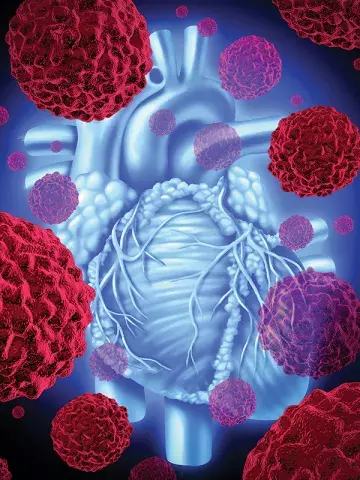Increased cardiovascular risk persists years after cancer diagnosis and treatment
By Michael Doris MB BS
Recognising the growing body of evidence for the interactions between oncology and cardiology, UK researchers have examined cancer-specific events for a range of incident cardiovascular outcomes, providing valuable insight into the needs of follow-up care in cancer survivors.
In their study published in Heart, the researchers examined the records of 18,714 UK Biobank participants with histories of breast, lung, prostate, colorectal, uterine and haematological cancer over a 12-year period. They used competing risk and linear regression methods to compare these participants’ data with those of controls without cancer to find links between cancer and heart disease.
Independent of vascular risk factors, the highest rates of incidental cardiovascular disease were in participants with lung (49.5%), haematological (48.4%) and prostate (40.6%) cancer, with ischaemic heart disease, atrial fibrillation/flutter and heart failure representing the most common adverse cardiovascular outcomes.
Participants with previous haematological cancer had the widest range of incident cardiovascular disease, and the researchers speculated that potential subclinical cardiotoxicity from the use of therapies for such malignancies may be a contributing factor.
The records of 1354 participants included magnetic resonance imaging of the cardiovascular system, which showed that cancer history was linked to adverse cardiac remodelling.
Professor Aaron Sverdlov, Director of Heart Failure and a Professor in Cardiology at the University of Newcastle’s Hunter Medical Research Institute, said this study confirmed previously published data that the incidence of cardiovascular events was significantly increased in cancer patients and survivors.
He said the study highlighted that both disease states ‘share a number of common risk factors, such as smoking, ageing and obesity.’
Professor Sverdlov, who is also Clinical Lead in Heart Failure and Cardio-oncology for the Hunter New England Local Health District and Co-director of the Newcastle Centre of Excellence in Cardio-oncology, remarked on the ‘greater than expected incidence of imaging-detected cardiac abnormalities.’ He noted that ‘very few cardiac MRIs are done in Australia (for clinical or research purposes), owing to high cost and lack of MBS reimbursement.’
With reference to the latest international cardio-oncology guidelines, position statements and Australian perspectives, Professor Sverdlov surmised that, ‘given the high burden of cardiovascular risk factors and increased incidence of cardiovascular adverse events in people living with and beyond cancer, our efforts should go towards best possible management of the said risk factors and throughout the cancer journey.’
Heart 2023; 0:1-9; doi:10.1136/heartjnl-2022-321888.


